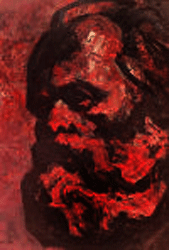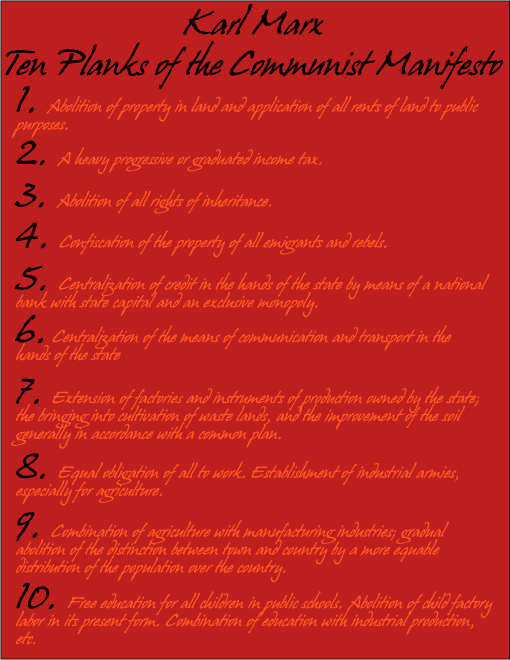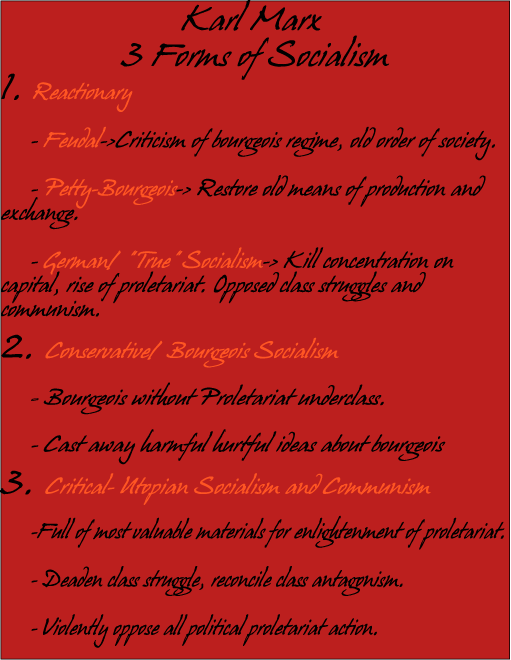
Greatest Collected Works
- Communist Manifesto
- The Communist Manifesto was written in 1848 by german economist Karl Marx and his colleague Friedrich Engels. Its overall purpose was to anticipate and precipitate the coming of a social reform and revolution.
- The Communist Manifesto pleads its case in phases. It first defines the stuggle between the proletariat and bourgoisie classes. It works to differentiate this movement from others, pushes for social reforms to happen and finally works to unite
the working class to rise up and combat the corruption. Marx uses examples throughout history to illustrate the growing need for
society and individuals with similar interests and experiences to band together; and through that the class distinctions were created.
"The discovery of America, the rounding of the Cape, opened up fresh ground for the rising bourgeoisie. The East-Indian
and Chinese markets, the colonization of America, trade with the colonies, the increase in the means of exchange and in commodities generally,
gave to commerce, to navigation, to industry, an impulse never before known, and thereby, to the revolutionary element in the tottering feudal
society, a rapid development"
Slaves, and masters; Emperors and Soldiers; Farmers and wives. The work progressively shows the growth and flourishment of the Bourgeoisie
and the proletariat during the feudal times, middle ages and even now in the current time."The modern bourgeois society
that has sprouted from the ruins of feudal society has not done away with class antagonisms. It has but established new classes, new conditions
of oppression, new forms of struggle in place of the old ones. Our epoch, the epoch of the bourgeoisie, possesses, however, this distinct feature:
it has simplified class antagonisms. Society as a whole is more and more splitting up into two great hostile camps, into two great classes directly
facing each other -- bourgeoisie and proletariat." Karl Marx further pushes the notion that the values unto which the world had
been brought up under such as family and commitment have been replaced my capital means."To be a capitalist, is to have not only
a purely personal, but a social STATUS in production. Capital is a collective product, and only by the united action of many members, nay, in the last
resort, only by the united action of all members of society, can it be set in motion. Capital is therefore not only personal; it is a social power."
He exclaims that as technology has advanced and increased so has the bourgeoisie."Hitherto, every form of
society has been based, as we have already seen, on the antagonism of oppressing and oppressed classes. But in order to oppress a class certain conditions
must be assured to it under which it can, at least, continue its slavish existence." This in turn has increased the proletariat
and middle class levels due to fluctuations in wages and labor.Marx' final point is that Communism eliminates class distinctions because it spreads
and equally distributes the wealth to all, so no man is looked upon better than another and that all share the load. He adds as a sweetener his 10 planks of Communism and concludes this argument by defining his idealized world and society. one without the weak and strong but a society of individuals holding the same load under their backs."When, in the course of development, class distinctions have disappeared, and all production has been concentrated in the hands of a vast association of the whole nation, the public power will lose its political character. Political power, properly so called, is merely the organized power of one class for oppressing another. If the proletariat during its contest with the bourgeoisie is compelled, by the force of circumstances, to organize itself as a class; if, by means of a revolution, it makes itself the ruling class, and, as such, sweeps away by force the old conditions of production, then it will, along with these conditions, have swept away the conditions for the existence of class antagonisms and of classes generally, and will thereby have abolished its own supremacy as a class.
In place of the old bourgeois society, with its classes and class antagonisms, we shall have an association in which the free development of each is the condition for the free development of all.
"Karl Marx successfully argues the point that their has always been a need and presence of the bourgeois and the proletariat in our physical history. What he asks is that if those class distinctions that technology, and advancement bring upon itself can be done away with. its a very important issue since it essentially decides who and how governs the country and its inter and intra relations with other nations and itself. The next and final question is whether or not it can survive if history is finally written anew?

- Marx touches on the various socialist and communist literatures that sprouted up during this time and the levels of "true" socialism that they contained. The focus on certain issues resulted in 3 separate forms of socialism. Reactionary Socialism, Conservative/ Bourgeois Socialism and Critical-Utopian socialism or Communism. REACTIONARY SOCIALISM is the resulting response of the aristocracy and their attempts to thwart the bourgeoisie. since it was a considerable threat to their controls. "The feudal aristocracy was not the only class that was ruined by the bourgeoisie, not the only class whose conditions of existence pined and perished in the atmosphere of modern bourgeois society. The medieval burgesses and the small peasant proprietors were the precursors of the modern bourgeoisie. In those countries which are but little developed, industrially and commercially, these two classes still vegetate side by side with the rising bourgeoisie." It caused the proletariat to fight and backlash against the nobility because the were shown a world where they had power and control over something, and just like alot of things in this life, once you are shown something that is better, more interesting and easier than people never want to go back to what they are used to. Through this arose a subset of reactionary socialism deemed Petty-Bourgeoisie socialism. In which the proletariat favored the traditional ways, values and customs however still wanted the socialist school of thinking aspects."In countries where modern civilization has become fully developed, a new class of petty bourgeois has been formed, fluctuating between proletariat and bourgeoisie, and ever renewing itself a supplementary part of bourgeois society. The individual members of this class, however, as being constantly hurled down into the proletariat by the action of competition, and, as Modern Industry develops, they even see the moment approaching when they will completely disappear as an independent section of modern society, to be replaced in manufactures, agriculture and commerce, by overlookers, bailiffs and shopmen.This school of socialism dissected with great acuteness the contradictions in the conditions of modern production. It laid bare the hypocritical apologies of economists. It proved, incontrovertibly, the disastrous effects of machinery and division of labor; the concentration of capital and land in a few hands; overproduction and crises; it pointed out the inevitable ruin of the petty bourgeois and peasant, the misery of the proletariat, the anarchy in production, the crying inequalities in the distribution of wealth, the industrial war of extermination between nations, the dissolution of old moral bonds, of the old family relations, of the old nationalities." On the other hand, "true" or german socialism also emerged which was the unwavering look at eliminating all forms of the bourgeois, since the bourgeois was an issue concerning capital means and the proletariat class."the long-wished for opportunity was offered to "True" Socialism of confronting the political movement with the socialistic demands, of hurling the traditional anathemas against liberalism, against representative government, against bourgeois competition, bourgeois freedom of the press, bourgeois legislation, bourgeois liberty and equality, and of preaching to the masses that they had nothing to gain, and everything to lose, by this bourgeois movement. German socialism forgot, in the nick of time, that the French criticism, whose silly echo it was, presupposed the existence of modern bourgeois society, with its corresponding economic conditions of existence, and the political constitution adapted thereto, the very things those attainment was the object of the pending struggle in Germany. To preserve this class is to preserve the existing state of things in Germany. The industrial and political supremacy of the bourgeoisie threatens it with certain destruction -- on the one hand, from the concentration of capital; on the other, from the rise of a revolutionary proletariat. "True" Socialism appeared to kill these two birds with one stone. It spread like an epidemic." The second form of socialism is CONSERVATIVE/BOURGEOIS SOCIALISM which, basically was bourgeois doing away with the proletariat all the meanwhile accepting the social changes in government and the laws of the land. It would seem like a nice idea for the people who were already established however; what is one to do with the rest of the population? 50 percent of france during the 1830s were considered proletariats; so a problem soon ensued with this form."The socialistic bourgeois want all the advantages of modern social conditions without the struggles and dangers necessarily resulting therefrom. They desire the existing state of society, minus its revolutionary and disintegrating elements. They wish for a bourgeoisie without a proletariat. The bourgeoisie naturally conceives the world in which it is supreme to be the best; and bourgeois socialism develops this comfortable conception into various more or less complete systems. In requiring the proletariat to carry out such a system, and thereby to march straightaway into the social New Jerusalem, it but requires in reality that the proletariat should remain within the bounds of existing society, but should cast away all its hateful ideas concerning the bourgeoisie." And on the final form, we are presented the CRITICAL-UTOPIAN SOCIALISM AND COMMUNISM, which is the inverse of the bourgeois intensive conservative socialism, is the complete uprising and controls given to the proletariat."The first direct attempts of the proletariat to attain its own ends, made in times of universal excitement, when feudal society was being overthrown, necessarily failed, owing to the then undeveloped state of the proletariat, as well as to the absence of the economic conditions for its emancipation, conditions that had yet to be produced, and could be produced by the impending bourgeois epoch alone. The revolutionary literature that accompanied these first movements of the proletariat had necessarily a reactionary character. It inculcated universal asceticism and social leveling in its crudest form. But these socialist and communist publications contain also a critical element. They attack every principle of existing society. Hence, they are full of the most valuable materials for the enlightenment of the working class. The practical measures proposed in them -- such as the abolition of the distinction between town and country, of the family, of the carrying on of industries for the account of private individuals, and of the wage system, the proclamation of social harmony, the conversion of the function of the state into a more superintendence of production -- all these proposals point solely to the disappearance of class antagonisms which were, at that time, only just cropping up, and which, in these publications, are recognized in their earliest indistinct and undefined forms only. These proposals, therefore, are of a purely utopian character.
It is summed up in the phrase: the bourgeois is a bourgeois -- for the benefit of the working class." Marx also provides a historical example to illustrate a period in history when this attempt was enacted. This movement drawns numerous questions, such as: Can a society due away with one form of itself that it does not like?, can it operate under one peoples?, can it survive with a nation of bourgeois or strictly proletariat? and in saying that how can the incremental increase of capital in certain individuals be kept constant in regards to the rest of the population?

- The final component of the Communist Manifesto is Karl Marx' intention to push and glorify communism above other systems and again he uses numerous various examples to explain how communism would have worked in that situation and would have fostered better results."The Communists fight for the attainment of the immediate aims, for the enforcement of the momentary interests of the working class; but in the movement of the present, they also represent and take care of the future of that movement. In France, the Communists ally with the Social Democrats * against the conservative and radical bourgeoisie, reserving, however, the right to take up a critical position in regard to phases and illusions traditionally handed down from the Great Revolution"Marx praises his ideal system and uses the history to push his points. but how can you limit growth and capitalism? how can one stop progression, or if you can foster progession how can you accurately determine and distribute the wealth of all the individuals who created/invented/designed the programs?"In all these movements, they bring to the front, as the leading question in each, the property question, no matter what its degree of development at the time.
Finally, they labor everywhere for the union and agreement of the democratic parties of all countries.
The Communists disdain to conceal their views and aims. They openly declare that their ends can be attained only by the forcible overthrow of all existing social conditions. Let the ruling classes tremble at a communist revolution. The proletarians have nothing to lose but their chains. They have a world to win.
Working men of all countries, unite!
"
Aristotle Link | Plato Link | Karl Marx Link | Home Link
Aristotle-Extensive |
Plato-Extensive |
Marx-Extensive |
Home-Extensive


